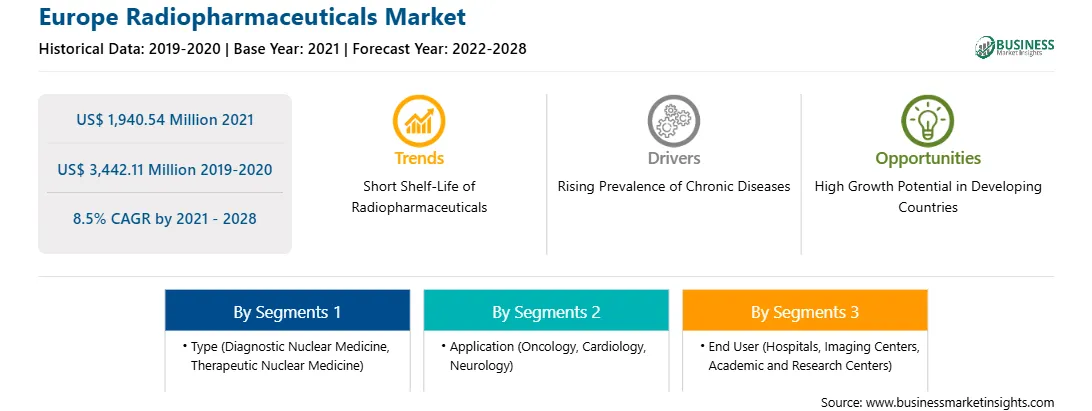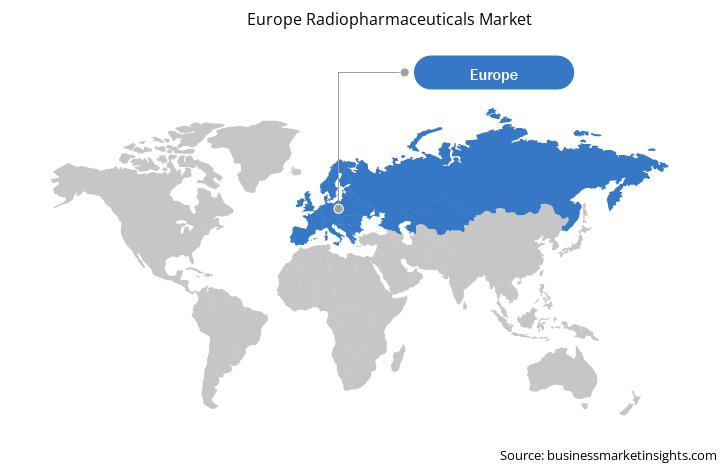Europe consists of five major countries namely Germany, France, UK, Italy, and Spain. Germany is one of the largest market of radiopharmaceuticals. The German Radiation Protection Ordinance and the guidelines on obtaining the special qualification contain regulations. In this ordinance specific numbers are listed for guidance, which, however, do not constitute binding minimum numbers. Moreover, in May 2017, Radiation Protection Act was adopted for the protection against radon in dwellings and better provisions for an emergency. The Radiation Protection Act is supplemented by the Radiation Protection Ordinance, which started from 31 December 2018. Furthermore, in Germany the health insurance is a major aspect of the healthcare industry, approximately 71.4 million Germans covered by statutory health insurance (Gesetzliche Krankenversicherung (GKV)) nearly 8.8 million Germans are covered by private health insurance (Private Krankenversicherung (PKV)) and via state aid. As per the German Federal Statistical Office, data for 2019 total annual healthcare expenditure accounted to US$460 billion (EUR 410 billion). In addition, the investments done by various government and non-government associations are helping radiopharmaceuticals market to grow. For instance, in January 2019, the Advancing Nuclear Medicine consortium, with the help of Nuclear Research and Consultancy Group (NRG), has been awarded an amount of US$ 7.7 million (EUR 6.8 million) subsidy for the development of FIELD-LAB. The Dutch initiative is aimed at accelerating the development and introduction of new radiopharmaceuticals. The ground will develop new nuclear medicines that are expected to take a growing role in the personalized treatment of life-threatening diseases like cancer. Therefore, according to the above-mentioned factors the Europe market for the radiopharmaceuticals is expected to grow in the forecast period.
In case of COVID-19, Europe is highly affected especially France and Russia. The COVID-19 pandemic has profoundly changed hospital activities, including NM practice across Europe. A literature search on PubMed was performed covering COVID-19 studies published up until January 2021. As per the findings, the pandemic strongly challenged NM departments, and a reduction in the workforce has been experienced in every center in Europe. NM departments introduced restriction measures to limit COVID-19 transmission, including rescheduling of non-high-priority procedures. Also, some of the departments experienced a delay in radiopharmaceuticals supply or technical assistance due to COVID-19. As a result, the pandemic resulted in a significant reduction of diagnostic and therapeutic NM procedures and a reduced level of care for patients affected by diseases other than COVID-19, such as cancer or acute cardiovascular disease. The pandemic influenced workflows in a substantial proportion of NM departments. New findings supporting COVID-19 diagnosis are expected to accelerate the growth of radiopharmaceuticals in the region. For instance, as per the research study by Chentao Jin et al., published in the European Journal of Nuclear Medicine and Molecular Imaging in May 2021, positron emission tomography (PET) is expected to offer pathophysiological alternations of COVID-19 and facilitate the clinical management of patients. With the role of PET in the COVID-19, the research studies can also pave the way in combating other epidemics in the future.

Strategic insights for the Europe Radiopharmaceuticals provides data-driven analysis of the industry landscape, including current trends, key players, and regional nuances. These insights offer actionable recommendations, enabling readers to differentiate themselves from competitors by identifying untapped segments or developing unique value propositions. Leveraging data analytics, these insights help industry players anticipate the market shifts, whether investors, manufacturers, or other stakeholders. A future-oriented perspective is essential, helping stakeholders anticipate market shifts and position themselves for long-term success in this dynamic region. Ultimately, effective strategic insights empower readers to make informed decisions that drive profitability and achieve their business objectives within the market.

| Report Attribute | Details |
|---|---|
| Market size in 2021 | US$ 1,940.54 Million |
| Market Size by 2028 | US$ 3,442.11 Million |
| Global CAGR (2021 - 2028) | 8.5% |
| Historical Data | 2019-2020 |
| Forecast period | 2022-2028 |
| Segments Covered |
By Type
|
| Regions and Countries Covered | Europe
|
| Market leaders and key company profiles |
The geographic scope of the Europe Radiopharmaceuticals refers to the specific areas in which a business operates and competes. Understanding local distinctions, such as diverse consumer preferences (e.g., demand for specific plug types or battery backup durations), varying economic conditions, and regulatory environments, is crucial for tailoring strategies to specific markets. Businesses can expand their reach by identifying underserved areas or adapting their offerings to meet local demands. A clear market focus allows for more effective resource allocation, targeted marketing campaigns, and better positioning against local competitors, ultimately driving growth in those targeted areas.

The Europe radiopharmaceuticals market is expected to grow from US$ 1,940.54 million in 2021 to US$ 3,442.11 million by 2028; it is estimated to grow at a CAGR of 8.5% from 2021 to 2028. In personalized care, treatment is individualized based on specific biochemical markers detected in patients as well as on the characteristics of their disease condition. Imaging techniques identify patients for particular therapies and optimize patient response to treatment while minimizing side effects. Precision medicine involves the use of an individual’s genomic information to offer them targeted treatment. In recent years, scientists are focusing on pioneering neurogenetics to introduce better therapies and treatment for brain and related disorders. Nuclear medicine is gaining pace gradually, and targeted radionuclide therapy provides efficacious treatment modalities against cancer. The latest innovations involve using radionuclides, new or improved multimodality imaging devices, and several recently marketed radiopharmaceuticals in all medical applications, particularly cardiology, neurology, and oncology. Current developments in self-shielded cyclotrons, video-monitored hot cell designs, improved targets, and automated PET radiopharmaceutical synthesis modules, based on computer-controlled graphic user interphase (GUI), have revolutionized the PET molecular imaging technology for basic biomedical research to accomplish evidence-based personalized medicine. Further advancements in novel PET radiopharmaceutical utilizing automated microfluidic synthesis modules and multifunctional nanoparticles, are likely to improve biomarker discovery, internal dosimetry, immunotherapy, pharmacokinetics, and stem cell tracking in regenerative medicine. The peptide receptor radionuclide therapy (PRRT) is at the forefront of new personalized medicines. The somatostatin analogs used in this technique, which bind selectively to cellular receptors on the neuroendocrine tumor cells, carry a gallium radionuclide that simultaneously emits radiation that kills tumors and makes the analogs visible as well as quantifiable with PET. The end effect of successful and measurable treatment is decreased tumor size and reduced symptoms, along with a halt in tumor progression in many patients. Thus, the use of nuclear medicines in personalized medicine is emerging as a prime future trend in the Europe radiopharmaceuticals market.
In terms of type, the diagnostic nuclear medicine segment accounted for the largest share of the Europe radiopharmaceuticals market in 2020. In terms of application, the oncology segment held a larger market share of the Europe radiopharmaceuticals market in 2020. Further, the hospitals segment held a larger share of the Europe radiopharmaceuticals market based on end user in 2020.
A few major primary and secondary sources referred to for preparing this report on the Europe radiopharmaceuticals market are company websites, annual reports, financial reports, national government documents, and statistical database, among others. Major companies listed in the report are Advanced Accelerator Applications; Bayer AG; Bracco Imaging S.p.A; Cardinal Health Inc; Curium; ECZACIBA?I MONROL NUCLEAR PRODUCTS CO.; GENERAL ELECTRIC; Lantheus Medical Imaging, Inc.; Nordion; and NTP RADIOISOTOPES.
The Europe Radiopharmaceuticals Market is valued at US$ 1,940.54 Million in 2021, it is projected to reach US$ 3,442.11 Million by 2028.
As per our report Europe Radiopharmaceuticals Market, the market size is valued at US$ 1,940.54 Million in 2021, projecting it to reach US$ 3,442.11 Million by 2028. This translates to a CAGR of approximately 8.5% during the forecast period.
The Europe Radiopharmaceuticals Market report typically cover these key segments-
The historic period, base year, and forecast period can vary slightly depending on the specific market research report. However, for the Europe Radiopharmaceuticals Market report:
The Europe Radiopharmaceuticals Market is populated by several key players, each contributing to its growth and innovation. Some of the major players include:
The Europe Radiopharmaceuticals Market report is valuable for diverse stakeholders, including:
Essentially, anyone involved in or considering involvement in the Europe Radiopharmaceuticals Market value chain can benefit from the information contained in a comprehensive market report.